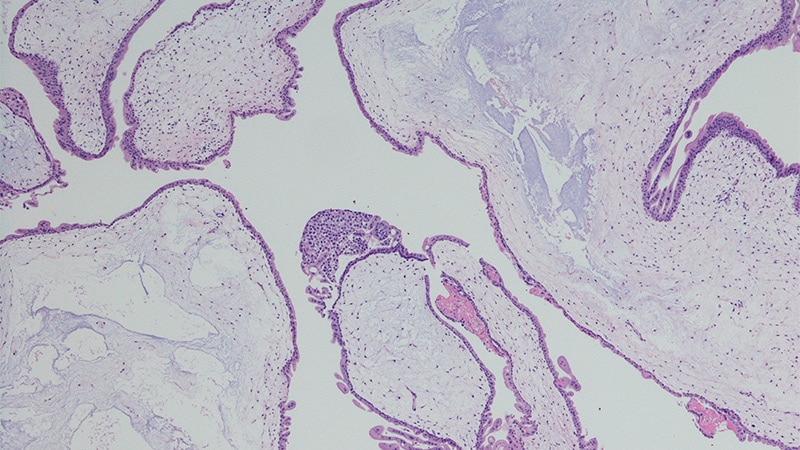Improving Radiotherapy Decisions for Endometrial Cancer Patients through Molecular Classification
Core Concepts
Incorporating molecular classifications into radiotherapy treatment decisions for endometrial cancer patients can help identify those who will benefit from or can avoid unnecessary treatment.
Abstract
The content discusses the importance of incorporating molecular classifications into radiotherapy treatment decisions for endometrial cancer patients. It highlights the recent updates to international guidelines that recommend using molecular classifications to guide adjuvant radiotherapy decisions.
The key points are:
- Deaths from endometrial cancer have increased over the past 20 years, prompting efforts to improve diagnosis and treatment.
- Recent evidence suggests that some patients with early-stage endometrial cancer may receive suboptimal care when treatment decisions are based solely on traditional clinicopathologic features and do not consider important molecular features.
- The updated guidelines recommend:
- Patients with DNA polymerase-epsilon–mutated tumors (favorable prognosis) should not receive adjuvant radiotherapy.
- Patients with no specific molecular profile (intermediate prognosis) should receive vaginal brachytherapy alone.
- Patients with p53-abnormal tumors (unfavorable prognosis) should receive pelvic external beam radiotherapy.
- An analysis of 153 women with non-mismatch repair deficiency stage I endometrioid endometrial cancer found that 63% were considered undertreated and 10% were considered overtreated when traditional clinicopathologic features were used instead of molecular classification.
- The study also found that Black patients were more likely to have aggressive disease (p53-abnormal), but 72% of them were considered undertreated.
- The authors conclude that broadening access to molecular classification can help alleviate outcome disparities for populations susceptible to more concerning disease.
Customize Summary
Rewrite with AI
Generate Citations
Translate Source
To Another Language
Generate MindMap
from source content
Visit Source
www.medscape.com
How to Improve Radiotherapy Decisions in Endometrial Cancer
Stats
96 out of 153 patients (63%) were considered undertreated when molecular classification was not used.
16 out of 153 patients (10%) were considered overtreated when molecular classification was not used.
70 out of 97 patients (72%) with no specific molecular profile who received no adjuvant radiotherapy were considered undertreated.
26 out of 29 patients (90%) with p53-abnormal endometrial cancer who did not receive pelvic external beam radiotherapy were considered undertreated.
10 out of 27 patients (37%) with a DNA polymerase-epsilon–mutated tumor who received any adjuvant radiotherapy were considered overtreated.
6 out of 97 patients (6%) with no specific molecular profile who received pelvic external beam radiotherapy were considered overtreated.
22% of Black patients had p53-abnormal endometrial cancer, compared to 9% of White patients and 0% of Asian patients.
18 out of 25 Black patients (72%) were considered undertreated.
Quotes
"Without refined genomic guidance, molecularly aggressive disease can be underrecognized."
"Broadening access to molecular classification may alleviate outcome disparities for populations that are susceptible to more-concerning disease."
Key Insights Distilled From
by Sharon Worce... at www.medscape.com 04-25-2024
https://www.medscape.com/viewarticle/how-improve-radiotherapy-decisions-endometrial-cancer-2024a100082v
Deeper Inquiries
What are the potential barriers to implementing molecular classification in routine clinical practice for endometrial cancer patients?
One potential barrier to implementing molecular classification in routine clinical practice for endometrial cancer patients is the availability and accessibility of the necessary technology and expertise. Molecular classification requires specialized testing and interpretation, which may not be readily available in all healthcare settings. Additionally, there may be challenges related to the cost of molecular testing and the time required to obtain results, which could impact the feasibility of widespread implementation. Furthermore, healthcare providers may require additional training to understand and effectively utilize molecular classification data in treatment decision-making.
How can the disparities in treatment outcomes between different racial/ethnic groups be further addressed beyond the use of molecular classification?
Beyond the use of molecular classification, addressing disparities in treatment outcomes between different racial/ethnic groups in endometrial cancer patients requires a multifaceted approach. One key aspect is increasing awareness and education among healthcare providers about the impact of race and ethnicity on cancer outcomes. This includes cultural competency training to ensure that all patients receive equitable care regardless of their background. Additionally, efforts to improve access to healthcare services, including screening, diagnosis, and treatment, in underserved communities can help reduce disparities. Engaging with community organizations and stakeholders to promote health equity and address social determinants of health is also crucial in addressing treatment outcome disparities.
What other emerging technologies or approaches could be integrated with molecular classification to further optimize radiotherapy decisions for endometrial cancer patients?
In addition to molecular classification, integrating artificial intelligence (AI) and machine learning algorithms could further optimize radiotherapy decisions for endometrial cancer patients. AI can analyze complex datasets, including molecular profiles, imaging studies, and treatment outcomes, to provide personalized treatment recommendations. By incorporating AI-driven decision support systems, healthcare providers can enhance the accuracy and efficiency of radiotherapy planning. Furthermore, advances in radiomics, which involves extracting quantitative data from medical images, can complement molecular classification by providing additional insights into tumor characteristics and treatment response. Combining these emerging technologies with molecular classification has the potential to revolutionize radiotherapy decision-making in endometrial cancer patients.
0
